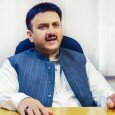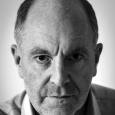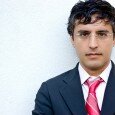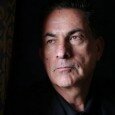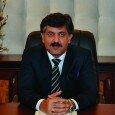By Noorilhuda –
Sitting over a pile of fifty seven billion rupees, with development projects worth hundreds more, heading an organization with eight-hundred employees, leading hundreds of educational institutions all the while juggling court cases, 18th Amendment and a media out to make a mountain of a molehill … it would be enough to make anyone sweat.
If Dr. Mukhtar Ahmed is nervous, he isn’t letting on. As the nominated head of Higher Education Commission – his name was announced rather abruptly on April 16th by the PM – it is back to basics at the Chairman’s office.
“I never even applied,” says the 55-year old father of five daughters, the youngest of whom is nine. “Someone can nominate you, and I was told that 5-6 people had nominated me, from Sindh, KPK etc … Finally I got a call for interview, which was an honor for me. Ahsan Iqbal, Ishrat Hussain and M. D. Shami were the interviewers. Their first question in the 15-minute interview was ‘why do you want to be chairman?’ and I replied, ‘I don’t want to be chairman, I am here to request you to get a good chairman for us.’ You see, if I wanted power, then Executive Director has more power than Chairman, and I was already ED.”
In HEC, the real show runner is always the ED, but chairman has the status of a federal minister and gets all the limelight with less workload. But his approval has garnered criticism.
The charges are that he is not a real ‘professor’ – i.e. an HEC-approved professor who is required to have a PhD in a relevant field with 15 publications in journals, a part of HEC law since 2005; that he has two degrees obtained the same year – another HEC specification designed to discourage people getting fraudulent degrees via distance learning; that his appointment is illegal since it was done before the second search committee had even begun its work. All these are part of lawsuits brought before the high court judge Shaukat Siddiqui who has made a reputation for arguing against the soundness of prime minister’s choices.
Then there are issues that began as soon as he became ED in 2013 after a contentious period of tussle between HEC chairman Leghari who wanted to retain Sohail Naqvi as ED and a staff establishment who were dead against the continuation of Naqvi’s tenure. These include his retention on a salary higher than designated for other MP-I scale employees; the alleged improper ‘termination’ of four employees and harassment of one.
If Dr. Ahmed is worried, he isn’t letting on. Sitting in his new office, across the corridor from the previous one, with a plethora of staff that wants his signature or praise, he discounts each of the claims against him in a soft deliberate voice, for two full hours. “People against me went through 27-years of my career and could only find this! If I have dual degrees, then it is something to be appreciated. MBA is a two year program, a PhD takes 5 years, I got both degrees from University of California the same day, 16th June 1995 … There was no HEC criteria for professors when I became one so the rule cannot be applied (retroactively), but yes, I have been in the administration side for a long time now and HEC Ordinance does not say chairman has to be a professor! I was a member Operations and Planning right here at HEC for 6 years before I joined The Islamic Educational, Scientific and Cultural Organization (ISESCO) – I never resigned – and was already getting paid closer to the MP-Scale ceiling at HEC, I left a sixteen thousand dollars per month tax free job at ISESCO to serve my country.”
Another reason for leaving the plush environment of Kingdom of Morocco – where ISESCO’s headquarter is based – was his mother. “She was not happy there, so I came back. When she heard of the harassment law suit against me, widely reported by all major news channels, she told me she was sorry to have brought me back to a place where I had to hear such lies about myself … she passed away recently.”
He recounts how surprised he was to see the shape HEC was in when he came back. “There was a lot of grouping, politics, a legal cell, a media cell, they were not doing anything constructive. I told such people that their contract will not be renewed, they filed cases against me for ‘wrongful’ termination, when no one was actually fired! Then Zia Batool (former DG Quality Assurance) said I physically harassed and threatened her, I never even saw her face! All this because they would not be made permanent employees! But I will not be blackmailed into submission. Whatever the cost, I stand by it.”
Who says bureaucracy does not have its fire cracking moments?
As for politicians, they can breathe a bit easy. This chairman is not interested in them. “Fake is fake. I believe in punishment, but comeuppance should come after punishment … HEC played wrong in the degree verification issue. If someone gets sick, it is not the job of the doctor to declare to the world that the man is sick. HEC used to provide information to the media to generate news for itself. That was ethical cheating. It damaged us.” Dr. Ahmed also accused Dr. Leghari of keeping the HEC-provided vehicles, laptop and iPad.
Dr. Ahmed’s desire for structure and following an established pattern probably comes from having dealt with instability early in life. Born in a village Hazro in district Attock, he is the eldest of eight siblings (6 sisters, 2 brothers) and was in second year when his veterinarian father died. “I did not study for two years, and God bless my chachaa (uncle) who supported me … I am proud I studied in taaton waala school (i.e. a school with no chairs for students). I am not from elite.”
His simplicity towards work is obvious from his vision for HEC: “I do not believe in drastic changes. HEC has been built for 10-12 years, now it’s time to step back and review where improvement is needed.” In fact, he spells it out bluntly: “We will not meet the Y2020 target of increased student enrollment. We slowed down due to financial uncertainty, earthquake and economy and government has to prioritize where to put money, its spending power is less, and our development budget will be reduced in coming years, though salaries budget will remain unchanged.”
PML-N government could not have a more conscientious man at helm. Or a more understanding one.
As for degrees being formulated according to the needs of a country say in renewable energy or health care, he says “We have to consolidate, not expand. How much job opportunity exists in Pakistan for new mediums? Neither do we have expertise nor market. Pakistan will face huge water and food security crisis in the future, but there has to be a basic degree first, which we provide.”
There is growing uneasiness over the post-18th Amendment scenario and what the future holds for HEC. Not to worry. Dr. Ahmed has a plan. “We are proposing that a) make four provincial HECs but give them new names instead of HEC-Punjab, Sindh etc. so that foreign countries do not get confused. b) All 4 provincial chairmen should be part of federal HEC commission. All policy can still be made here, and implementation will be at their end.”
Clearly not the one to ruffle any feathers, he figures that staff at federal level will not be reduced since “we already work with limited resources.”
He adds: “Muslims ruled the world. Then Islamic World distanced itself from education and did not preserve its culture. Now Malaysia, Turkey and Iran have very good educational system. It has nationalism, ownership and continuity.” His first trip abroad in May is to Saudi Arabia, the capital of Islam, if not educational enterprise. With Dr. Ahmed, someone’s prayers have already been answered.
The writer is a journalist based in Islamabad.






















































































